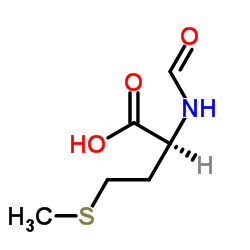Immunization with f-Met peptides induces immune reactivity against Mycobacterium tuberculosis
S.W. Dow, A. Roberts, J. Vyas, J. Rodgers, R.R. Rich, I. Orme, T.A. Potter
文献索引:Tuber. Lung Dis. 80(1) , 5-13, (2000)
全文:HTML全文
摘要
Objective: To determine whether synthetic peptides containing an amino terminal formyl-methionine residue and corresponding to the sequence of several proteins produced by Mycobacterium tuberculosis, would elicit an immune response in mice. Design: Peptides corresponding to the amino termini of 8 M. tuberculosis proteins and initiating with formyl methionine residues were synthesized. The ability of these peptides to bind to the mouse non-classical MHC class I molecule H-2M3awas determined by flow microfluorimetry. These peptides were used to pulse dendritic cells that were then injected into normal mice. These mice were subsequently challenged with aerosolized M. tuberculosis and, 30 days later, the number of viable bacteria in the lungs was determined. Results: Four of the 8 synthetic peptides bound to H-2M3aand stabilized its expression on the cell surface. Injection of mice with dendritic cells pulsed with H-2M3abinding peptides elicited non-MHC restricted cytotoxic T lymphocytes that killed peptide pulsed target cells and macrophages infected with M. tuberculosis. Immunization of mice with syngeneic dendritic cells pulsed in vitro with 2 of these peptides led to retardation of the growth of M. tuberculosis following aerosol challenge. Conclusion: Peptides that bind to non-polymorphic class I molecules can elicit immune reactivity directed towards M. tuberculosis.
相关化合物
| 结构式 | 名称/CAS号 | 分子式 | 全部文献 |
|---|---|---|---|
 |
N-甲醯甲硫胺酸
CAS:4289-98-9 |
C6H11NO3S |
|
A novel amino acid analysis method using derivatization of m...
2015-03-21 [Analyst 140(6) , 1965-73, (2015)] |
|
Functional roles of TAP and tapasin in the assembly of M3-N-...
2001-08-01 [J. Immunol. 167(3) , 1507-14, (2001)] |
|
Immunization with gp96 from Listeria monocytogenes-infected ...
2001-12-01 [J. Immunol. 167(11) , 6480-6, (2001)] |
|
Variable immunodominance hierarchies for H2-M3-restricted N-...
2001-01-15 [J. Immunol. 166(2) , 1132-40, (2001)] |
|
Glucose 6-phosphate release of wild-type and mutant human br...
2005-11-18 [J. Biol. Chem. 280(46) , 38403-9, (2005)] |